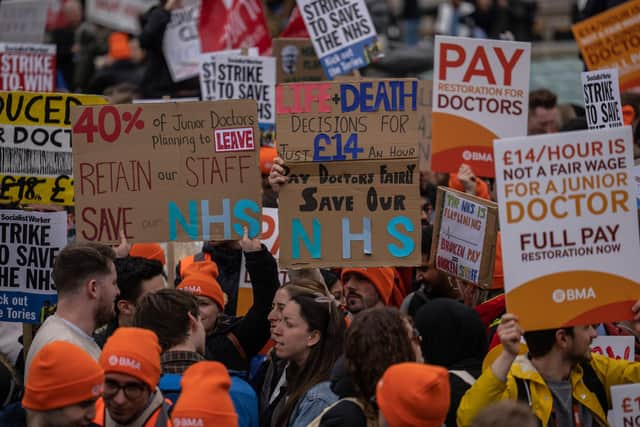Doctors strike Sheffield: Figures reveal impact on city hospitals including Northern General and Children’s
and live on Freeview channel 276
NHS statisitcs show that across Sheffield Teaching Hospitals and Sheffield Children’s Hospital, 2,950 appointments had to be rescheduled during the 96 hours of action from April 11 until April 14.
Sheffield Children's Hospital Trust saw 22 elective inpatient and day patient appointments rescheduled, and 362 outpatient appointments put back, with an average of 27 on strike each day.
Advertisement
Hide AdAdvertisement
Hide AdSheffield Teaching Hospitals NHS Foundation Trust 247 saw elective inpatient and day patient appointments rescheduled, and 2,319 outpatient appointments postponed. There were between 425 and 453 on strike each day.


Helen Cotton, deputy chief operating Officer for Sheffield Children’s NHS Foundation Trust, said: “We realise that cancelled and rearranged appointments were disruptive for families during recent junior doctors strikes. This was necessary to ensure we maintained safe staffing levels for emergency care during this time. We intend to reduce the backlog created by the strikes as part of our wider plan to cut our waiting lists that have not yet recovered since the COVID-19 pandemic.”
Nationally, over the four days last week there were 195,000 cancellations. At the peak of the action, there were 27,361 staff not at work due to industrial action. There were however a high number of nil returns on the workforce data collection so these figures are not the full picture. In the previous junior doctors strike there were 175,000 cancellations across three days.
NHS national medical director, Professor Sir Stephen Powis, said: “Today’s figures lay bare the colossal impact of industrial action on planned care in the NHS. Each of the 195,000 appointments postponed has an impact on the lives of individuals and their families and creates further pressure on services and on a tired workforce – and this is likely to be an underestimate of the impact as some areas provisionally avoided scheduling appointments for these strike days.
Advertisement
Hide AdAdvertisement
Hide Ad“Our staff now have an immense amount of work to catch up on hundreds of thousands of appointments, all while continuing to make progress on tackling the backlog of people who have been waiting the longest for treatment. We have now seen nearly half a million appointments rescheduled over the last five months, and with each strike, it becomes harder. While our staff are doing all they possibly can to manage the disruption, it is becoming increasingly difficult and the impact on patients and staff will unfortunately continue to worsen.”
Dr Vivek Trivedi and Dr Robert Laurenson, BMA junior doctors committee co-chairs, said: “Junior doctors know all too well the frustration of patients waiting too long for care, and with a waiting list of 7.2 million in England, we are facing difficult conversations with them every single day.
“These millions of patients are not in this position because of strikes though. Persistent under-resourcing of the health service and under-valuing staff – exacerbated by a pandemic – mean we simply don’t have the workforce and capacity to provide the high-quality and timely care that patients need and deserve."
